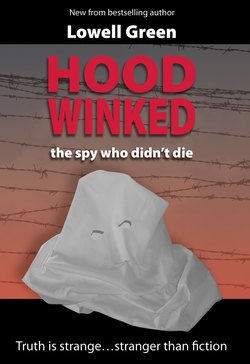Читать книгу Hoodwinked - the spy who didn't die - Lowell Ph.D. Green - Страница 15
На сайте Литреса книга снята с продажи.
Freedom
ОглавлениеI DON’T NEED TO FIND THE PARTISANS. They find me! I am digging frantically at the door with my stone weapon when the world explodes beneath me.
When I awake I am lying in what appears to be some kind of underground hut with my broken right leg encased in primitive splints fashioned from boards that look suspiciously like those which, when last I was conscious, enclosed a statue of Christ on the Cross and a stowaway. Strangely, I feel almost no pain from my leg, but my buttocks are screaming at me, as though someone has been digging around with a shovel. Which, as it turns out, is pretty much what has been going on.
My groans rouse an old woman who is nodding off in a corner. Stiffly, she rises to her feet and hobbles to the pile of rags that serves as my bed. Bending over in the dim light is a face the weather has beaten into something resembling a burlap bag. Picture Willie Nelson without the beard, bandana or guitar! Her laugh, as she holds up a jagged piece of metal nearly the size of my fist, reveals a fine set of gums but not a single tooth. Saying something in Polish that I cannot understand, she whacks her rump with the chunk of metal then yanks it away quickly with one hand while pointing to my rear with the other. Another laugh. I hate to say cackle, but in truth that’s more descriptive. An unlikely angel!
Someone, I hope to high heaven not her, has removed what is obviously a chunk of shrapnel from my buttocks. What I am able to piece together in the coming days is that, in fact, it is this old lady who set my broken leg, hacked out the shrapnel and patched up several less serious wounds to my legs and back, thus undoubtedly saving my life.
Even with the primitive equipment available, her skill is such that all I have to remind me today of a partisan’s roadside bomb that shattered the truck and killed the driver and the armed guard, is a small star-shaped scar on my right buttock and as I grow older, a slight limp.
I have no idea what her real name is. She never tells us. To all of us who spent time in that tiny hole in the ground, she is simply Babunia, or sometimes Baba, which I eventually figured out, is Polish for old woman or grandma. I am told she escaped from Warsaw as the Nazis were jamming Jews into that infamous ghetto and that while she spent most of her life milking cows on a dairy farm, she had some training as a veterinarian.
Her experience may have been with animals, but she tends me with great care for much of that spring, changing my dressings, feeding me and brewing up a painkiller from the bark of surrounding birch trees. Morphine is far too valuable to waste on broken legs or injured flanks!
During the summer, several wounded partisans are brought into our zimlanka, which is what these concealed hiding places deep in the Belarusian forests are called. As quickly as the partisans are patched up and able to walk, they disappear back to whatever fighting units they are attached to. I never talk to any of them, the theory being that the less we know about each other, the less information the Nazis’ torture can extract.
One of the wounded is a young, quite attractive Polish woman whose right hand has been partially blown off by the premature exploding of a mine she was setting near a German checkpoint. One day as she and Babunia are chatting quietly in a corner, I notice them throwing amused glances in my direction. With a slight nod, Babunia stiffly clambers up the short ladder leading to the surface, leaving the two of us alone.
Babunia’s legs have barely disappeared from view when my little Polish partisan, without a word or warning, tears off her clothes, yanks down my blanket and with a fierce cry, mounts me with marvelous vigour!
Startled and fearful for the safety of my damaged limb, I try to push her off; then, realizing that my leg is as much up to the task as everything else, I quickly get into the spirit of things, and there on a sorry bed of rags in a Kurapaty forest zimlanka, surrounded by a world gone mad with death and destruction, we take of life what life can give. Finally exhausted, we clutch each other like desperate lovers. It’s not love, but it’s all we have.
Sadly, the opportunity never presents itself again and several days later she too disappears. I have often thought about her and on one occasion tried to track her down, but I suspect that she, as with many partisans, was eventually caught and killed by the Germans.
Belarusian partisan in a forest dugout (zimlanka) with his family, 1944
